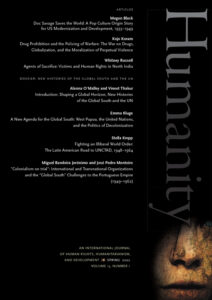HUMANITY, VOLUME 13, ISSUE 1
 Our latest issue is out! It features a dossier on new histories of the Global South and the UN, essays on the Doc Savage pop culture series and American modernization narratives, the War on Drugs and policing as perpetual violence, and sex work and human rights in North India.
Our latest issue is out! It features a dossier on new histories of the Global South and the UN, essays on the Doc Savage pop culture series and American modernization narratives, the War on Drugs and policing as perpetual violence, and sex work and human rights in North India.
TABLE OF CONTENTS
Abstract: This article contends that important scripts for US-led modernization were trademarked not by political and academic elites of the Cold War era, but rather by low-brow cultural producers of the New Deal period. It pinpoints key characterizations, motivations, plotlines, and settings associated with international development in the long-running pulp magazine series starring “Doc Savage” (1933–1949). Through historical analysis and close readings, the article offers a fresh account of how US audiences came to imagine technical assistance as a proper course for American power while
Read More »
Abstract: This article examines the shifting dynamics between policing and warfare as reflected in the War on Drugs over the twentieth century. Despite the UN’s international drug control treaties being written in language of humanitarianism, the drug prohibition that emerged from these laws exemplifies the growth of “New War.” The drug war, with its violent methods of armed combat, lethal force, incarceration, asset seizure, and land dispossession, was a continuation of familiar warfare. But it also marks a shift away from the traditional structure of
Read More »
Abstract: This article identifies a kind of victim-subject in North India that defies what is known about victimhood. On one hand, human rights literature offers a victim who negotiates narratives into a coherent biography of victimization. On the other, are helpless victims who cannot do the same. “Rita,” however, lies outside both understandings. The role of kinship and family, combined with her community’s status as both tribe and caste, create a context in which Rita’s decision to engage in sex work becomes an act of
Read More »
Abstract: This introduction lays out the agenda for this special issue. We argue for more inclusive histories of the UN system which incorporate the role of the Global South in shaping its past and present. In general, we ask: how have the Global South actors and coalitions/formations critiqued, interrogated, nuanced, and advanced the principles and practice of liberal world order? In order to set up the conceptual context for the essays in the collection, we argue that the “Global South” is neither a place nor
Read More »
Abstract: This article examines the West Papuan campaign for independence in the lead up to the agreement signed between Indonesia and the Netherlands in 1962, leading to the recolonization of West Papua. West Papuan leaders argued for decolonization separate from Indonesia, based on their interpretations of United Nations principles and claims to a distinct ethnic identity. However, West Papuan claims were rejected because their understanding of self-determination clashed with international norms as well as Cold War and Afro-Asian political imperatives. This case study reveals the
Read More »
Abstract: Even though Latin American diplomats and economists played a crucial role in the formulation and the theorizing of development economics, Latin American contributions to development debates in the United Nations have often been relegated to the margins. Based on sources from Brazilian and Cuban archives, the Organization of American States, as well as the UN archive, the paper relates the Latin American road to the creation of the United Nations Conference on Trade and Development, in a struggle to fight what they perceived as
Read More »
Abstract: The United Nations was a dynamic “force field” for international and transnational cooperation and a forum for consequential, transformative interactions between the “West” and the “Global South.” This article focuses on the role played by alliances and solidarity networks, formed by a plurality of actors with diverse agendas, that systematically questioned the Portuguese empire-state’s legitimacy and mobilized the languages of self-determination, human rights, and non-discrimination. As the article concludes, these historical dynamics concurred for important legal and political changes within the Portuguese imperial formation
Read More »
 Our latest issue is out! It features a dossier on new histories of the Global South and the UN, essays on the Doc Savage pop culture series and American modernization narratives, the War on Drugs and policing as perpetual violence, and sex work and human rights in North India.
Our latest issue is out! It features a dossier on new histories of the Global South and the UN, essays on the Doc Savage pop culture series and American modernization narratives, the War on Drugs and policing as perpetual violence, and sex work and human rights in North India.